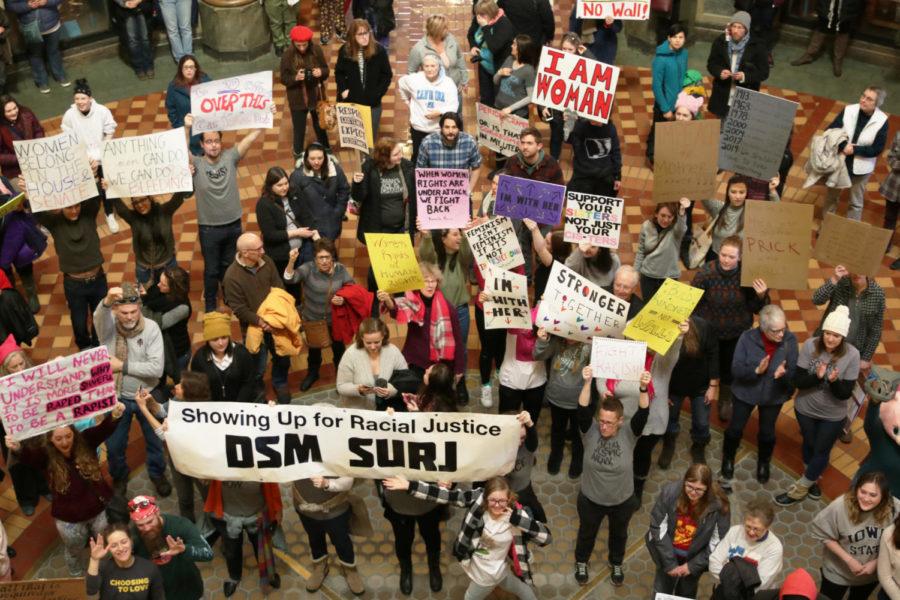#Women’sWave touts inclusivity, unprecedented number of women running for office
January 20, 2019
The cold weather didn’t stop the hundreds of Iowans who congregated inside the Iowa Capitol Building in Des Moines on Saturday from joining the thousands of people all across the United States rallying in their state capitols for the 2019 Women’s March.
2019 marks the third Women’s March. The first march was perceived to be a direct response to the election of President Donald Trump and has since evolved to be a meeting place for those who share the belief that “women’s rights are human rights and human rights are women’s rights,” according to the organization’s official website.
“The Women’s March is a time for not just women, but for anyone who supports women’s rights,” said Alissa Stoehr, professor of sociology at Iowa State. “What we have seen in our society and in our government since 2016, it really has led disenfranchised groups such as women to be like, ‘enough’s enough. We need healthcare, adequate reproductive healthcare, we need more funding for healthcare, we need the Violence against Women Act to pass,’ all of these things. It is a way for people to stand up and be counted.”
The march’s agenda consists of 10 major principles that the 70 leaders and organizers hope to see politicians pay more attention to: disability rights, civil rights and liberties, reproductive rights and health, economic justice, immigrant rights, LGBTQIA+ rights, racial justice, environmental justice, ending violence against women and ending state violence.
This year’s theme of “#Women’sWave” is a response to the unprecedented number of women running for office as well as winning and flipping seats in the 2018 midterm elections.
This midterm election, roughly 43 percent of women who appeared on the ballots won their elections.
“It is kind of playing on the fact that 2018 was such a big year for women in terms of their representation and their being elected to office,” said Tessa DiTonto, Iowa State professor of political science. “It’s sort of a wave, and it also speaks to the metaphor of the ‘waves’ of the feminist movement. First wave referred to suffrage, second wave was the women’s movement of the ‘60s and ‘70s, so there is speculation about ‘Are we in another wave of feminist activism?” I think it is kind of referring to that as well.”
Women of power from all over came to speak about the importance of women and their role in the government.
Iowa District 3 Representative Cindy Axne spoke about the importance of unity.
“My mom taught us to always stand up for what is right, to fight back against injustice, to make sure that we protect the people in our community, no matter if we knew them or not, because we are absolutely all in this together,” Axne said.
Axne was joined by Kylä Patterson, Jacquelinne Haller, Bonnie Brown, Christine Nobiss and Deidre DeJear, all of whom spoke to the importance of inclusivity, respect and the involvement of women not only in the national government but in the local government.
Keynote speaker Sen. Kirsten Gillibrand talked about the issue of equal representation in the government, women’s empowerment and the government shutdown.
“Women still do not represent 51 percent of the elected leaders in this country,” Gillibrand said. “Imagine, for just a moment, what America would look like if it did.”
This year’s #WomensWave encourages young women, and anyone else who feels strongly about the rights of women and other disenfranchised groups, to stand up and be heard.
“Women want to be involved in the political process,” Stoehr said. “They want to be involved in their futures. A lot of women are sick and tired of people telling them how they can live their lives.
It’s important to be able to be the leaders of their own destinies, having their voices heard and being able to stand up for themselves with privilege and power.”







